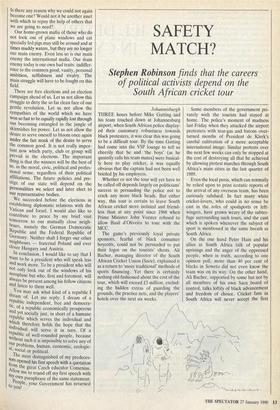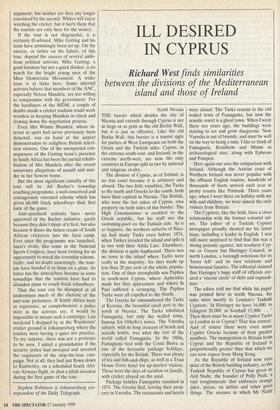SAFETY MATCH?
Stephen Robinson finds that the careers
of political activists depend on the South African cricket tour
Johannesburgh THREE hours before Mike Gatting and his team touched down at Johannesburg airport, when South African police display- ed their customary robustness towards black protesters, it was clear this was going to be a difficult tour. By the time Gatting had come into the VIP lounge to tell us cheerily that he and 'the boys' (as he quaintly calls his team mates) were basical- ly here to play cricket, it was equally obvious that the captain had not been well briefed Iv his employers.
Whether or not the tour will yet have to be called off depends largely on politicians' success in persuading the police not to crack any more black heads. But either way, this tour is certain to leave South African cricket more isolated and friend- less than at any point since 1968 when Prime Minister John Vorster refused to allow Basil d'Oliveira to tour with the MCC.
The game's previously loyal private sponsors, fearful of black consumer boycotts, could not be persuaded to put their logos on the tourists' chests. Ali Bacher, managing director of the South African Cricket Union (Sacu), explained it as a return to 'more traditional' methods of sports financing. Yet there is certainly nothing old-fashioned about the cost of the
tour, which will exceed million, exclud- ing the hidden extras of guarding the grounds, the practice nets, and the players' hotels over the next six weeks.
Some members of the government pri- vately wish the tourists had stayed at home. The police's moment of madness last Friday when they attacked the airport protesters with tear-gas and batons over- turned months of President de Klerk's careful cultivation of a more acceptable international image. Similar protests over the next few weeks can only be stopped at the cost of destroying all that he achieved by allowing protest marches through South Africa's main cities in the last quarter of 1989.
Even the local press, which can normally be relied upon to print ecstatic reports of the arrival of any overseas team, has been curiously subdued. In fact many white cricket-lovers, who could in no sense be cast in the roles of spoilsports or left- wingers, have grown weary of the subter- fuge surrounding such tours, and the cant which is spoken whenever the subject of sport is mentioned in the same breath as South Africa.
On the one hand Peter Hain and his allies in South Africa talk of popular uprisings and the anger of the oppressed people, when in truth, according to one opinion poll, more than 40 per cent of blacks in Soweto did not even know the team was on its way. On the other hand, Ali Bacher, supported by some but not by all members of his own Sacu board of control, talks loftily of black advancement and freedom of choice. Cricket fans in South Africa will never accept the first argument, but neither are they any longer convinced by the second. Whites will enjoy watching the cricket, but it hurts them that the tourists are only here for the money.
If the tour is not disgraceful, it is certainly ill-advised. Mike Gatting and his team have unwittingly been set up. On the success, or rather on the failure, of this tour, depend the careers of several ambi- tious political activists. Mike Gatting, a good batsman but not a quick thinker, is no match for the bright young men of the Mass Democratic Movement. A wider issue is at stake here. Some internal activists believe that members of the ANC, especially Nelson Mandela, are too willing to compromise with the government. For the hardliners of the MDM, a couple of deaths inside a cricket stadium could work wonders in keeping Mandela in check and slowing down the negotiation process.
Even Mrs Winnie Mandela, whose in- terest in sport had never previously been detected, was on hand at the airport demonstration to enlighten British televi- sion viewers. One of the unexpected con- sequences of the Getting team's presence in South Africa has been the partial rehabi- litation of Mrs Mandela after the recent unsavoury allegations of assault and mur- der in her Soweto home.
But the most significant casualty of this tour will be Ali Bacher's township coaching programme, a well-conceived and courageously executed scheme which has given 60,000 black schoolboys their first taste of the game.
Anti-apartheid activists have never approved of the Bacher initiative, partly because they didn't think of it first, but also because it draws the future cream of South African cricketers into the Sacu camp. Ever since the programme was launched, Sacu's rivals, like some in the National Sports Congress, have been looking for an opportunity to wreck the township scheme. Sadly, and no doubt unwittingly, the tour- ists have handed it to them on a plate. So bitter has the atmosphere become in some townships that the tourists have had to abandon plans to coach black schoolboys.
That the tour can be disrupted at all undermines much of the rhetoric of the anti-tour protesters. If South Africa were as repressive, as comprehensive a police state as the activists say, it would be impossible to mount such a campaign. Last weekend I dropped by at the Wanderers' cricket ground in Johannesburg where the tourists were having a quiet net practice. To my surprise, there was not a protester to be seen. I asked a groundsman if the security police had swooped and arrested the organisers of the stop-the-tour cam- paign. Not at all; they had just flown down to Kimberley, on a scheduled South Afri- can Airways flight, to plan a pitch invasion during the first game of the tour.
Stephen Robinson is Johannesburg cor- respondent of the Daily Telegraph.



























































 Previous page
Previous page